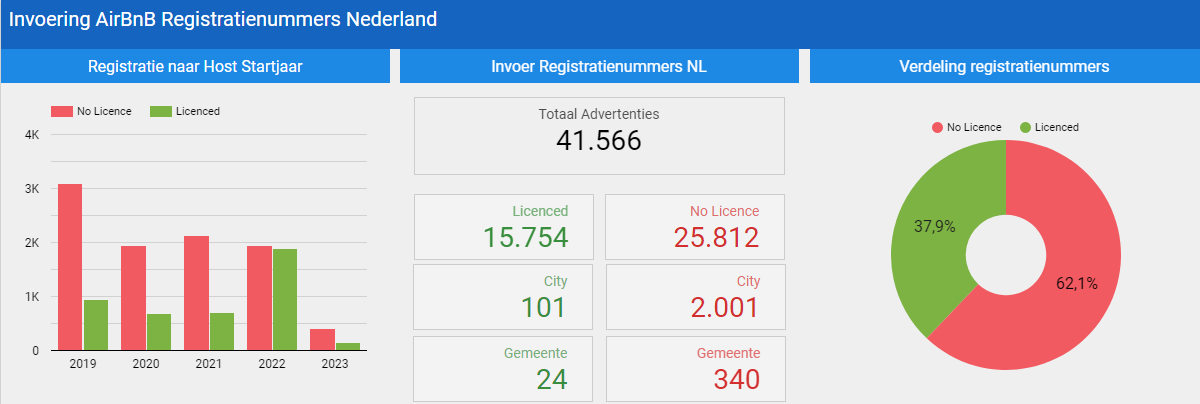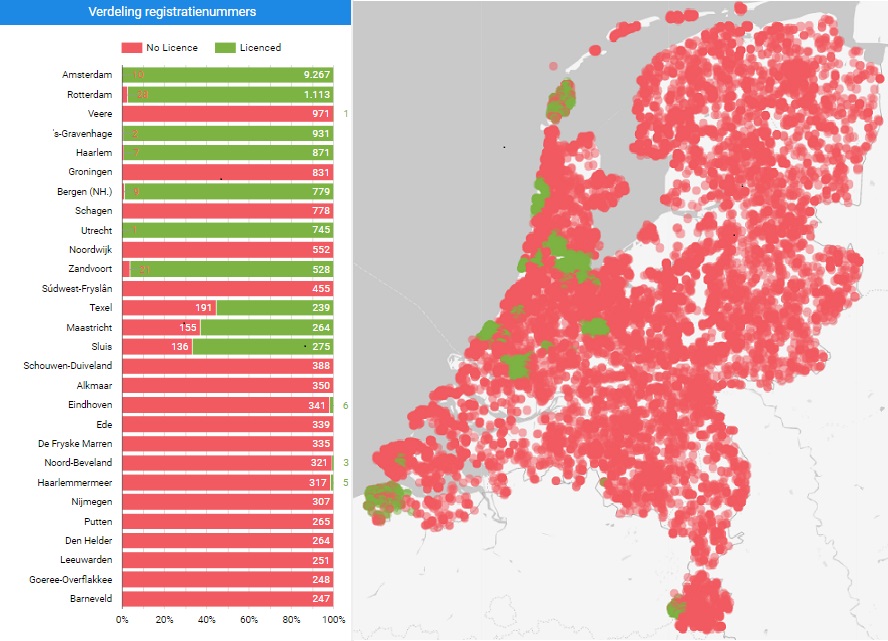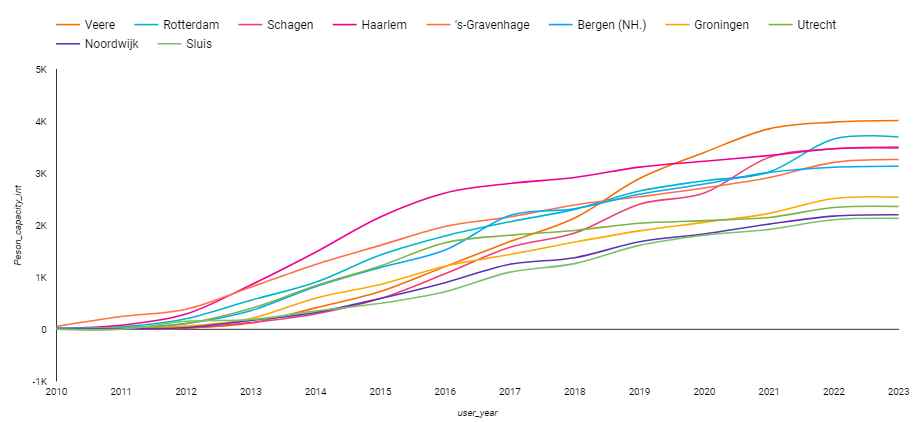
Currently, Airbnb Netherlands lists over 40,000 short term rental advertisements, of which 37.9% have a registration number (as of May 2023). Registration numbers are clearly gaining ground—and for good reason, as renting out your own home to tourists has become commonplace. For some, it’s a nice way to earn extra income, while others have turned renting into their primary job. Moreover, it’s happening all across the Netherlands. It’s no surprise, then, that municipalities want to regulate in areas where this causes disruptions.
Registration Number as an Instrument
With the “New Tourist Rental of Residential Property Act” (2021), municipalities have gained tools to regulate unwanted side effects of short-term tourist rentals. One of these instruments is the “registration number”, linked to the citizen service number (Dutch BSN) and the official address identification (BAG ID) of the rental location. This provides municipalities insight into rental locations and allows them to establish regulations—for instance, determining whether social housing may be used for tourist rentals. Additionally, if complaints about disturbances from residents in a particular neighborhood increase, the municipality can decide to stop issuing new registration numbers in that area.
Early adopters of the registration requirement include Amsterdam, The Hague, Rotterdam, Utrecht, Zaanstad, Gouda, and Diemen. In 2022, Haarlem, Zandvoort, Sluis, Leiden, Texel, Middelburg, Noordwijk, Maastricht, Naarden, Groningen, and Noordwijkerhout followed. In 2023, Weesp joined due to its integration with Amsterdam, as did the municipality of Delft. In many municipalities, Airbnb is the largest provider of holiday rentals, whereas in traditional holiday destinations such as coastal provinces, Airbnb’s market share is significantly smaller.
Registration Number Obligation
Is it necessary to fine hosts who fail to include a registration number in their advertisements? Most cities prefer to first observe how implementation proceeds during an initial period. However, we see that after about a year, most municipalities introduce penalty clauses anyway, as hosts otherwise tend not to comply with using the registration number. Following a six-month transition period—which gives existing hosts time to update their advertisements—ads displaying registration numbers become visible.
The figure below shows a list of municipalities and the number of Airbnb registrations. Municipalities highlighted in green have implemented mandatory registration numbers along with penalty clauses. In Maastricht and Texel, registration numbers became mandatory on April 1st, but Airbnb has not yet removed all advertisements lacking registration numbers. Please note: listings from platforms like Booking, VRBO, Expedia, and TripAdvisor are not included in the figure, meaning actual numbers are higher.

Agreements with Platforms
When a host receives a registration number from the municipality, this number must be included in their advertisement. Municipalities enforcing a registration number requirement subsequently approach various rental platforms directly to communicate that these platforms must no longer display advertisements without a registration number or an exemption in their jurisdiction. As an example, upon introducing the registration number requirement in Amsterdam, Airbnb removed 13,724 listings—representing 82% of their previous offering. Not only Airbnb but also Booking.com removed advertisements following the implementation of the tourist rental law; they are legally obligated to do so, as non-compliance constitutes a criminal offense.
Platforms have created specific fields when posting new advertisements. Terms and conditions for placing ads explicitly inform hosts or advertisers about the requirement to comply with local tourism laws. Advertisers themselves fill in either the registration number or exemption. In practice, we observe that major international platforms such as Expedia, VRBO, and TripAdvisor continue to publish listings without registration numbers.
Incorrect Usage of the registration number
How is the registration number being used in practice, and what do we observe? In most cases, the registration number is correctly included in rental advertisements. However, approximately 10% of cases involve incorrect usage:
(1) An incorrect registration number is provided. Examples include using a phone number, entering only zeros instead of the correct number, or a random number.
(2) Using one registration number for multiple locations. Different locations feature varying photos, descriptions, and titles—indicating deliberate misuse.
(3) Hosts mistakenly believe they have an exemption when they do not. Exemptions are defined differently across municipalities’ housing regulations, causing confusion and resulting in incorrect exemption claims.
(4) A notable exception includes companies targeting expats that use identical attractive photos and the same registration number across multiple cities.
Number of Available Beds Steadily Increasing
According to Statistics Netherlands (CBS), the number of guests staying in Dutch accommodation rose by 40% in 2022 compared to the previous year. While specific data on private rentals isn’t available, the collection of tourist taxes from hosts serves as a reliable indicator. The website gemeente.nu publishes the “Atlas van de Lokale Lasten” (Atlas of Local Taxes) by the University of Groningen (COELO), which concludes that tourist taxes have seen the sharpest rise among other local taxes.
Below is a figure illustrating the growth in bed capacity on Airbnb in the Netherlands over the years. There has been continuous growth since 2010, indicating that tourist rental offerings are steadily increasing.
Note: This figure only shows beds currently available; those previously offered but no longer available are excluded. The city of Amsterdam has been omitted from this figure.

Conclusion
Renting out one’s home to tourists has become commonplace, and the number of available beds is steadily increasing. To regulate short-term rentals, an increasing number of municipalities are introducing registration numbers and incorporating penalty clauses into their housing regulations to encourage hosts to comply. The initial steps toward regulating tourist rentals have been implemented. Municipalities facing the most issues now have a clearer understanding of the problem, along with policy measures, regulatory tools, and enforcement resources.
Short-stay platforms must comply with local tourism regulations under European law and thus remove listings without registration numbers if requested by the municipality. Matching issued registration numbers with those displayed on rental websites remains the municipality’s responsibility, particularly considering privacy legislation.
Sources:
Airbnb
Bezoek Airbnb voor meer informatie over de Nederlandse advertenties.
Rijksoverheid
De website van de Rijksoverheid bevat informatie over de lokale regelgeving: toeristischeverhuur.nl
